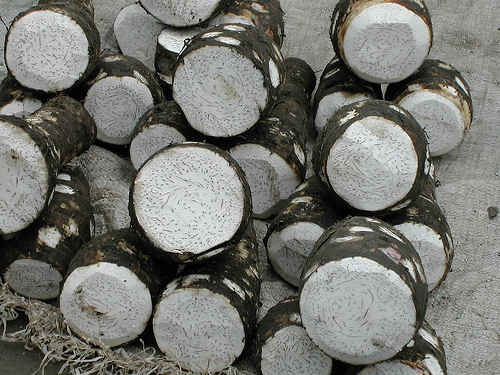Pandemic Threatens African Staple Crop

The New York Times reports that Africa is currently experiencing a pandemic of a mutated virus affecting the cassava crop. Cassava is Africa’s main staple crop, and is right behind wheat and rice as the number one staple crop in the world.
That newcomer, brown streak, is now ravaging cassava crops in a great swath around Lake Victoria, threatening millions of East Africans who grow the tuber as their staple food.
Although it has been seen on coastal farms for 70 years, a mutant version emerged in Africa’s interior in 2004, “and there has been explosive, pandemic-style spread since then,” said Claude M. Fauquet, director of cassava research at the Donald Danforth Plant Science Center in St. Louis. “The speed is just unprecedented, and the farmers are really desperate.”
[…]
The threat could become global. After rice and wheat, cassava is the world’s third-largest source of calories. Under many names, including manioc, tapioca and yuca, it is eaten by 800 million people in Africa, South America and Asia.
The danger has been likened to that of Phytophthora infestans, the blight that struck European potatoes in the 1840s, setting off a famine that killed perhaps a million people in Ireland and forced even more to emigrate.
Several other crop pandemics have been successfully contained in Africa over the past few decades, but none affecting a crop as widely used as cassava. Here’s hoping that the attempts at containment are successful.
Image Credit: Angela Sevin
That is very bad news, indeed. So many African countries are terribly fragile without a pandemic affecting the cassava.
The larger problem, however, is monoculture. Our species is dependent on fewer crops now that at any time in our history, just 50 or so IIRC. If the strain of Ug99 going around isn’t dealt with soon, the wheat crop could have severe problems, too. Again, the underlying problem is monoculture.
Large scale especially corporate farming favors monoculture. I’m not really sure what the remedy might be. It’s a problem similar to the big bank problem. I suspect that policy encourages size rather than efficiencies of scale but I couldn’t lay out the detailed mechanism for you.
Wow. The world just can’t catch a break lately. From earthquakes to economic meltdowns to crop viruses, it’s not an easy time to be on this planet.